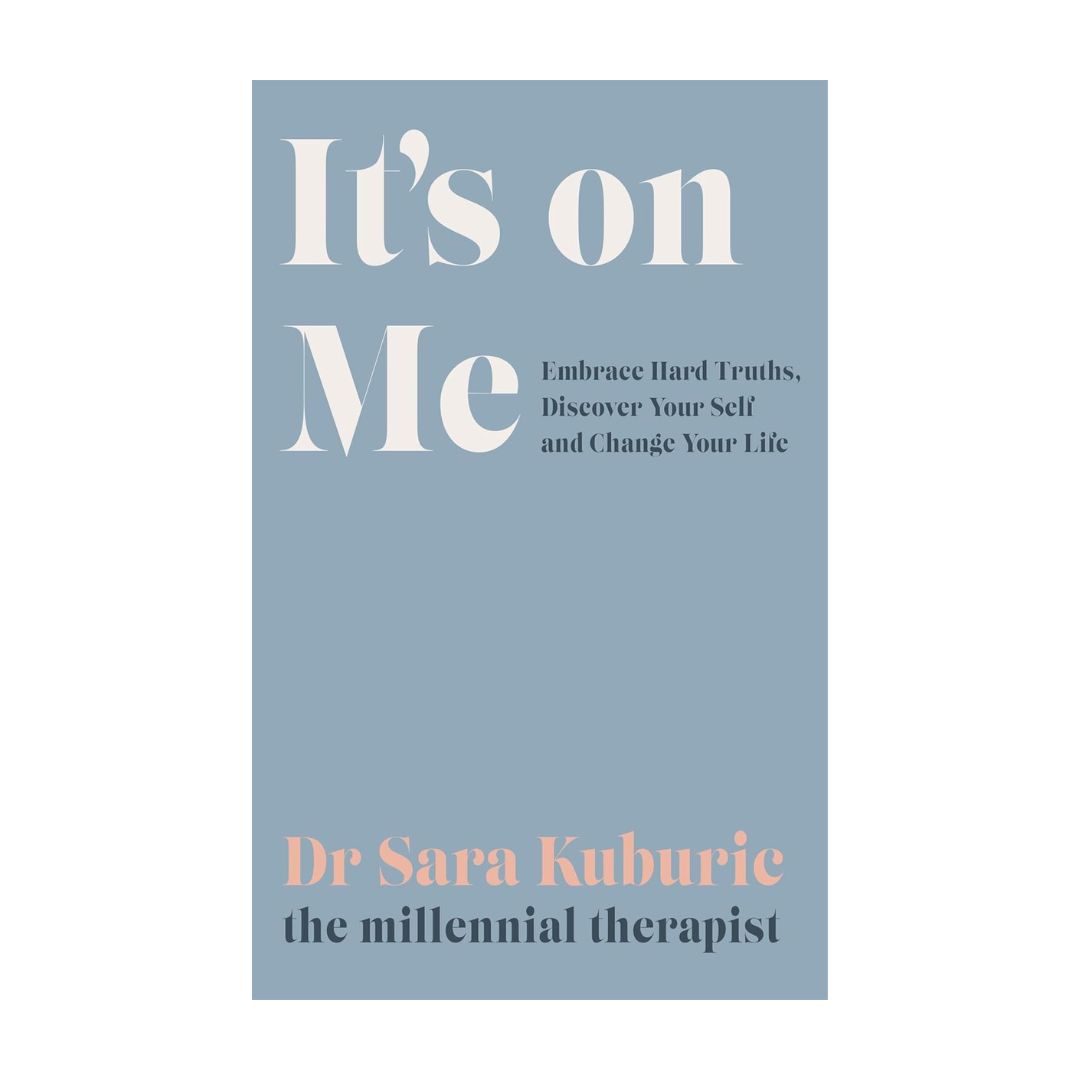I'm a world-renowned psychotherapist - why mastering your emotions is the key to overall wellbeing
"Authenticity involves acknowledging your feelings and deliberately deciding how to express them."

If you're someone who works out regularly, cooks veg-packed meals and prioritises daily journaling, then you might think you've got your wellbeing routine down to a tee. Right? Well, kind of. While all of those things no doubt play a part in a healthy routine, we know that mental wellbeing and how we're feeling is just as important as looking after your physical health.
Case in point: you could be the fittest you've ever been but still battling internally with negative emotions that, at times, feel like they control or overwhelm you. You're not alone, if that's the case - 74% of adults have felt so stressed at some point over the past year that they felt overwhelmed or unable to cope, according to recent stats from The Priory Group.
While it can feel daunting knowing where to start with developing your mental fitness, to begin with, look at it this way - taking the time to nurture a more calm and positive mindset is a brilliant way to invest in your long-term happiness. By identifying what's causing you to feel overwhelmed and getting more in tune with your innermost feelings and emotions, you can also develop the key coping mechanisms and tools to manage future stress.
Being mindful not to label certain emotions (think anger or sadness) as "negative" can be an impactful tool, too. "Any emotion that feels disruptive or uncomfortable is often labelled, not only because we dislike experiencing them, but also because they may seem pointless," shares psychotherapist and author of It's On Me Dr Sara Kuburic. "Recognizing that all emotions serve a purpose and act as messengers can help shift this perception. Emotions are there to heighten our awareness, foster embodiment, and support deeper connections with ourselves and others."
Think of it this way - anger can signal that your boundaries are being crossed, while sadness can indicate a sense of loss. "Reframing emotions as valuable data rather than obstacles allows us to embrace their essential role in our growth," she goes on.
Ready to master your own emotional fitness? Scroll for a guide from the globally renowned psychotherapist on how to master your own feelings, plus the warning flags that you might be letting your emotions get the better of you. Don't miss our guides on how to manage stress, plus the best essential oils for stress, stress patches, and stress supplements, while you're here.
How to master your feelings and emotional fitness, according to a top psychotherapist
What are the key signs of an unhealthy relationship with our emotions?
According to Dr Kuburic, there are several key signs that you may have an unhealthy or unhelpful relationship with your own emotions.
Marie Claire Newsletter
Celebrity news, beauty, fashion advice, and fascinating features, delivered straight to your inbox!
1. Avoidance
Ever feel like you're actively trying to escape or evade your emotions by keeping yourself preoccupied? Examples include constant distractions such as binge-watching shows, endlessly scrolling social media, excessive drinking, or staying busy with work. "This is a classic example of running away from the feelings, hoping they won’t catch up to you," explains Dr Kuburic.
2. Suppression
The next warning sign? Consciously ignoring or pushing down emotions when they arise without processing them. "Telling yourself that you don’t have time for this, pretending you’re fine when you’re not, or forcing yourself to stay positive are all further examples," she goes on.
A post shared by Dr. Sara Kuburic (@millennial.therapist)
A photo posted by on
3. Judgement
Ever found yourself labelling certain emotions as "bad" or "weak"? This is a classic example of letting your emotions control you or get on top of you, shares Kuburic, as we should be able to acknowledge our emotions with a healthy sense of detachment.
4. Inconsistency
Another warning sign that it might be time to work on your emotional regulation? Alternating between emotional outbursts and complete detachment.
5. Powerlessness
Last but by no means least, only addressing emotions once they are extreme, in turn making it impossible to ignore them, is another classic red flag. "If you feel like your emotions are controlling your decisions or actions and there is very little you can do about it, then it might be time to address things," she goes on.
A post shared by Dr. Sara Kuburic (@millennial.therapist)
A photo posted by on
How does an unhealthy relationship with our emotions impact us day to day?
So, how does this impact our overall wellbeing? In short - a lot. "An unhealthy relationship with your emotions can cause them to unconsciously guide your actions, leading to impulsive or misaligned choices and, at times, somatic symptoms like headaches or stomach aches," shares Dr Kuburic. Not only that, but if you're unaware of your emotions or unable to articulate them, it can impact your day-to-day relationships by creating misunderstandings and emotional distance, she goes on.
On the other end of the spectrum, being disconnected from our emotions can manifest as a lack of self-awareness, inner conflict, or self-loss.
So, the all-important question: how can we distinguish between expressing emotions authentically and being controlled by them? "Authenticity involves acknowledging your feelings and deliberately deciding how to express them," shares our expert. "Being controlled by emotions means reacting impulsively, without processing or reflecting on what you’re experiencing. The key difference is intentionality: Are you choosing how to respond, or are your emotions dictating your actions?"
How to get acquainted with your emotions
The first step to solving an unhealthy relationship with our emotions, Kuburic explains, is getting acquainted with your emotions - especially if you feel you've spent your whole life ignoring or suppressing them. Yes, it'll likely be difficult, but it's absolutely vital to be able to improve what she calls your "emotional fitness."
Below, she shares her top tips.
- Start small: Pause during your day to ask, “What am I feeling right now?”
- Name it: Labeling emotions helps diminish their intensity and raise insight.
- Body awareness: Emotions often manifest physically—tightness, heaviness, warmth—so notice bodily cues.
- Try journaling: Writing down your feelings can create a safe space to explore them (What triggered an emotion? What emotions seem to be coming up frequently? Where do you feel your emotions in your body? What beliefs do you have about any and all emotions?).
- Seek support: Therapy or supportive relationships can help you safely reconnect with suppressed emotions.
Shop MC UK approved wellness products now:

Sara's revolutionary guide is a must-buy if you're keen to learn more about your innermost self, self-loss, and the freedom that comes from taking responsibility for how we live.

lululemon's Align leggings have been best-sellers since they launched back in 2015 thanks to their butter soft, technical material that also looks good for brunch and shopping dates.

Keen to keep track of your progress and process your emotions by journaling? We're fans of this Productivity Method Daily Planner, which comes with handy prompts and ample space to jot down your innermost thoughts.

Last but by no means least, snuggle up in this cosy Adanola hoodie to do your best thinking. Their kit is cute, cosy and chic - what more could you want?

Ally Head is Marie Claire UK's Senior Health and Sustainability Editor, nine-time marathoner, and Boston Qualifying runner. Day-to-day, she heads up all strategy for her pillars, working across commissioning, features, and e-commerce, reporting on the latest health updates, writing the must-read wellness content, and rounding up the genuinely sustainable and squat-proof gym leggings worth *adding to basket*. She also spearheads the brand's annual Women in Sport covers, interviewing and shooting the likes of Mary Earps, Millie Bright, Daryll Neita, and Lavaia Nielsen. She's won a BSME for her sustainability work, regularly hosts panels and presents for events like the Sustainability Awards, and is a stickler for a strong stat, too, seeing over nine million total impressions on the January 2023 Wellness Issue she oversaw. Follow Ally on Instagram for more or get in touch.
-
 Mytheresa is having a secret sale right now and these are the 11 cult items I'm eyeing
Mytheresa is having a secret sale right now and these are the 11 cult items I'm eyeingIncluding the designer bag that was everywhere at Milan Fashion Week
By Clementina Jackson
-
 Prince Harry reportedly extended an 'olive branch' to Kate and William on latest UK trip
Prince Harry reportedly extended an 'olive branch' to Kate and William on latest UK tripBig if true
By Iris Goldsztajn
-
 How Prime Video is protecting Blake Lively amid her new movie promo
How Prime Video is protecting Blake Lively amid her new movie promoAn understandable move
By Iris Goldsztajn
-
 The entire UK seems to be obsessed with saunas RN - 9 benefits to know about, if you're considering giving them a go
The entire UK seems to be obsessed with saunas RN - 9 benefits to know about, if you're considering giving them a goEnter your Scandi girl era.
By Anna Bartter
-
 As Mel Robbins' Let Them theory gains global traction - how the simple tool promises to transform your life
As Mel Robbins' Let Them theory gains global traction - how the simple tool promises to transform your lifeNot to mention, help you take back control.
By Katie Sims
-
 I'm a leading wellness expert - and always turn to these 5 simple prompts before saying yes to a decision
I'm a leading wellness expert - and always turn to these 5 simple prompts before saying yes to a decisionAlways feel torn? Consider this your bible.
By Adrienne Adhami
-
 Wellness patches claiming to boost energy, mood and more are all the rage RN - so do they work? We ask experts
Wellness patches claiming to boost energy, mood and more are all the rage RN - so do they work? We ask expertsIs better health really just a stick-on patch away?
By Anna Bartter
-
 I started 2025 by facing my ultimate fear—here’s why you should, too
I started 2025 by facing my ultimate fear—here’s why you should, too“If we don’t face our fears and change that mindset, we’ll never know if actually it’s something we will enjoy."
By Mischa Anouk Smith
-
 Burnout: “My days blurred into late nights at the office, fuelled by stress and a compulsion to prove myself”
Burnout: “My days blurred into late nights at the office, fuelled by stress and a compulsion to prove myself”Life after burnout: How women can recognise, recover, and reclaim balance
By Dorothy Herson
-
 Feeling frazzled RN? Your fail-safe guide to how to boost calm, any place, any time
Feeling frazzled RN? Your fail-safe guide to how to boost calm, any place, any timeTop pros share how they keep their cool.
By Camille Dubuis-Welch
-
 Being outside is one of the most effective ways to boost calm - 4 invaluable lessons I learnt from an off-grid weekend
Being outside is one of the most effective ways to boost calm - 4 invaluable lessons I learnt from an off-grid weekendIt's a busy time of year - but sometimes, all it takes to boost calm is to step outside.
By Ally Head